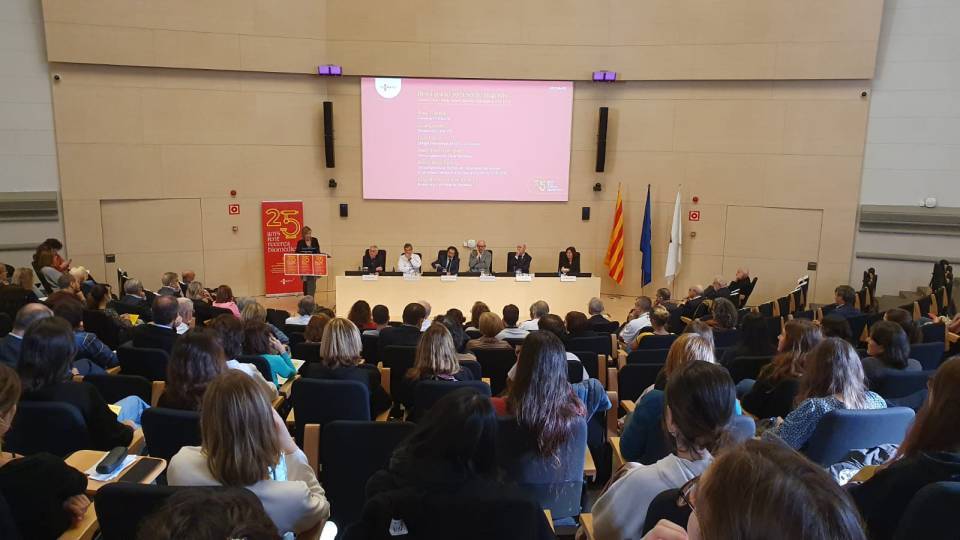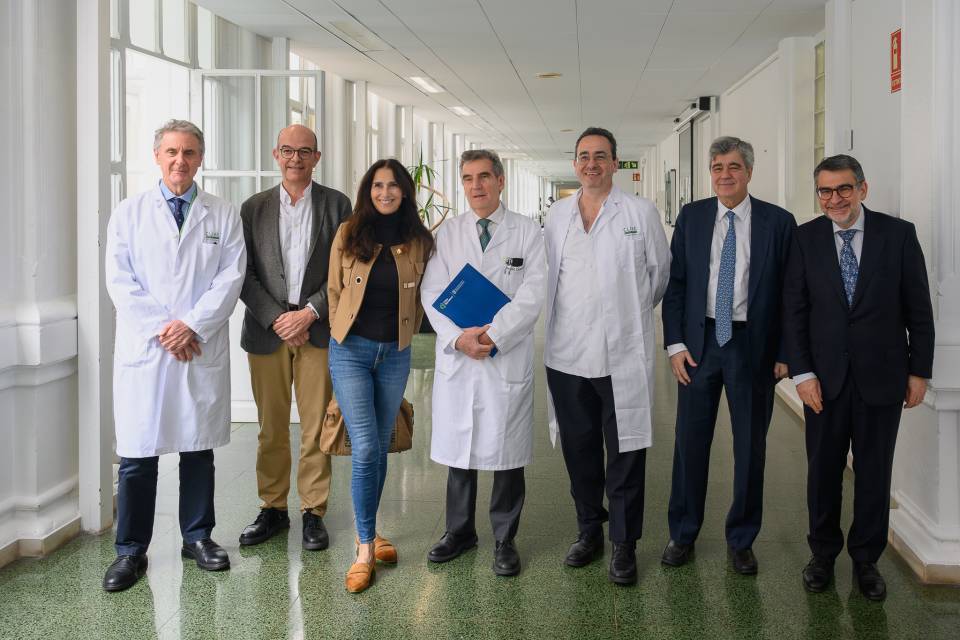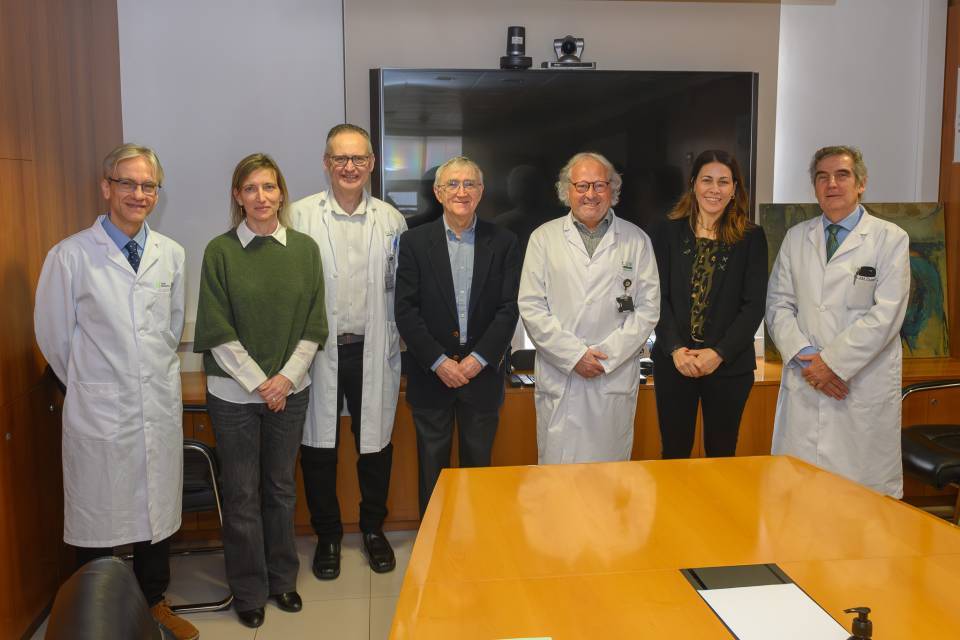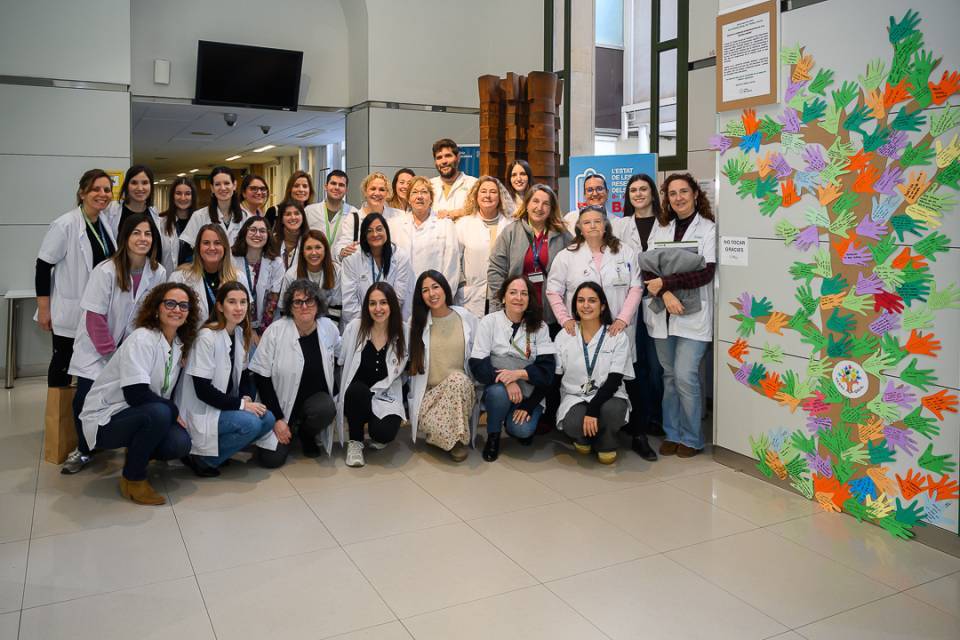Today, Friday 11 November 2022, we are celebrating the 25th anniversary of the founding of the August Pi i Sunyer Institute of Biomedical Research (IDIBAPS).
The celebration will include the presence of Manel Balcells, Minister of Health; Joan Guàrdia, Rector of the University of Barcelona, Joan Gómez Pallarès, Director General of Research in the Ministry of Business and Knowledge and Chairman of the Board of Governors of IDIBAPS; Josep M. Campistol, Director General of the Hospital Clínic Barcelona; Lluís Calvo, Institutional Delegate of the CSIC in Catalonia; Elías Campo, Director of IDIBAPS, Rosa Vilavella, Manager and Michela Bertero, Director of Strategy at IDIBAPS.
There will also be a tribute to Ramon Gomis, former Director of IDIBAPS, in which Andreu Mas-Colell, President of the Barcelona Institute of Science and Technology (BIST) and Marc Claret and Rosa Gasa, researchers at IDIBAPS, will participate.
The ceremony, which will be held in the auditorium of the Faculty of Medicine and Health Sciences of the University of Barcelona, should have been celebrated at the end of 2021, but this was prevented by the pandemic.
A success story
IDIBAPS is a biomedical research centre of excellence, which carries out translational research. In other words, it seeks to ensure that issues that arise at the patient’s bedside are addressed in the laboratory, and that advances made in the laboratory are quickly transferred to patients.
It is a public consortium comprising the Government of Catalonia, the Hospital Clínic of Barcelona, the Faculty of Medicine and Health Sciences of the University of Barcelona, and the CSIC Institute of Biomedical Research in Barcelona. IDIBAPS is a CERCA centre and was the first centre to be accredited as a Healthcare Research Institute by the Carlos III Health Institute in 2009.
Over the course of these 25 years, IDIBAPS has become the leading biomedical research centre in Catalonia and in Spain, since it is the centre that publishes most scientific articles in indexed journals.
In 2021, 2,700 publications were generated: over 1,800 original articles, around 360 reviews, 260 letters and case reports and over 70 editorial articles and 70 clinical guidelines, etc. Full details can be found in the report.
Since it was founded, IDIBAPS has published over 30,000 scientific articles, which have allowed us to gain a better understanding of the main diseases in our environment, and have paved the way for tackling them more effectively. This research has resulted in new therapeutic targets, treatments, protocols and clinical guidelines to improve the quality of life of patients.
Thanks to the quality of the research carried out at IDIBAPS, 15 researchers are or have been among the most highly cited in the world according to the list compiled annually by Clarivate Analytics. IDIBAPS is the biomedical research centre with the largest number of professionals on the list in Spain.
Biomedical research in the hospital environment
“One of the strengths of IDIBAPS is its close ties with the Hospital Clínic Barcelona, which means that issues that arise at the patient’s bedside can be addressed in the laboratory”, explains Elías Campo. “Moreover, the hospital has a long tradition of research, which is handed down from generation to generation. The medical professionals at the Hospital Clínic devote 1.5% of their salary to promoting research, and we have programmes that make it easier for them to combine their healthcare and research work", he adds.
The research carried out at IDIBAPS is divided into six research areas covering different fields. These areas bring together the 106 research groups in which nearly 1,700 professionals work.
From the discovery of new diseases or improving our knowledge of how they work to the design of new advanced treatments, IDIBAPS has achieved several milestones over the course of its 25-year history. The following are worthy of note:
The discovery of a new family of diseases
Autoimmune encephalitis is a collection of inflammatory diseases of the central nervous system in which the immune system mistakenly attacks the body’s own proteins. The action of antibodies prevents the proper functioning of these proteins in the brain, which can lead to the appearance of neuropsychiatric symptoms such as for example changes in behaviour, psychosis, convulsions and impaired cognition and memory.
Dr. Josep Dalmau led the team that discovered 11 of the 17 types of autoimmune encephalitis that affect the central nervous system; four during the period after he started working at the Hospital Clínic-IDIBAPS in 2011.
The most influential institution in Hepatology research in the world
The Hospital Clínic-IDIBAPS tops the list of institutions with most articles among the 100 most highly cited in the field of Hepatology, according to a study published in the journal Gastroenterología y Hepatología. This makes it the most influential institution in research into this area.
This influence of the Hospital Clínic-IDIBAPS on Hepatology research worldwide is attributed to the leadership by Dr. Joan Rodés, one of the most prestigious hepatologists in the world who had the vision to found IDIBAPS and the Hospital Clínic Foundation for Biomedical Research to bring together all the research that was carried out at the Hospital Clínic under one roof. This was key to boosting research into the liver and also into other specialities in which the Hospital Clínic-IDIBAPS plays an important role.
Leading the sequencing of the leukaemia genome
Dr. Elías Campo, Director of IDIBAPS and Professor of Anatomical Pathology at the University of Barcelona, was the co-director of the Spanish ICGC-CLL genome project focusing on the sequencing of the genome for chronic lymphatic leukaemia, the type of leukaemia most common in western countries.
In this project, the genome and epigenome for leukaemia have been sequenced, in other words the chemical changes in the genetic material and its regulatory proteins. This has changed the previously held view of the disease and allowed us to gain valuable information for its diagnosis and treatment.
Leaders in advanced cell therapies
The IDIBAPS and Hospital Clínic teams have developed and validated treatments with CAR-T cells for two types of blood cancer: acute lymphoblastic leukaemia and multiple myeloma.
The joint work by different services and research groups has allowed the Spanish Agency of Medicines and Medical Devices (AEMPS) to approve CAR-T ARI-0001 as a non-industrial, advanced therapy drug for use in patients over 25 years old with lymphoblastic leukaemia resistant to conventional treatment. This was the first CAR-T developed entirely in Europe to be approved by a regulatory agency.
At the end of 2021 the results were presented of a new CAR-T, ARI-0002h, for the treatment of multiple myeloma. This new therapy demonstrated an efficacy of over 70% after following up the patients treated for one year.




